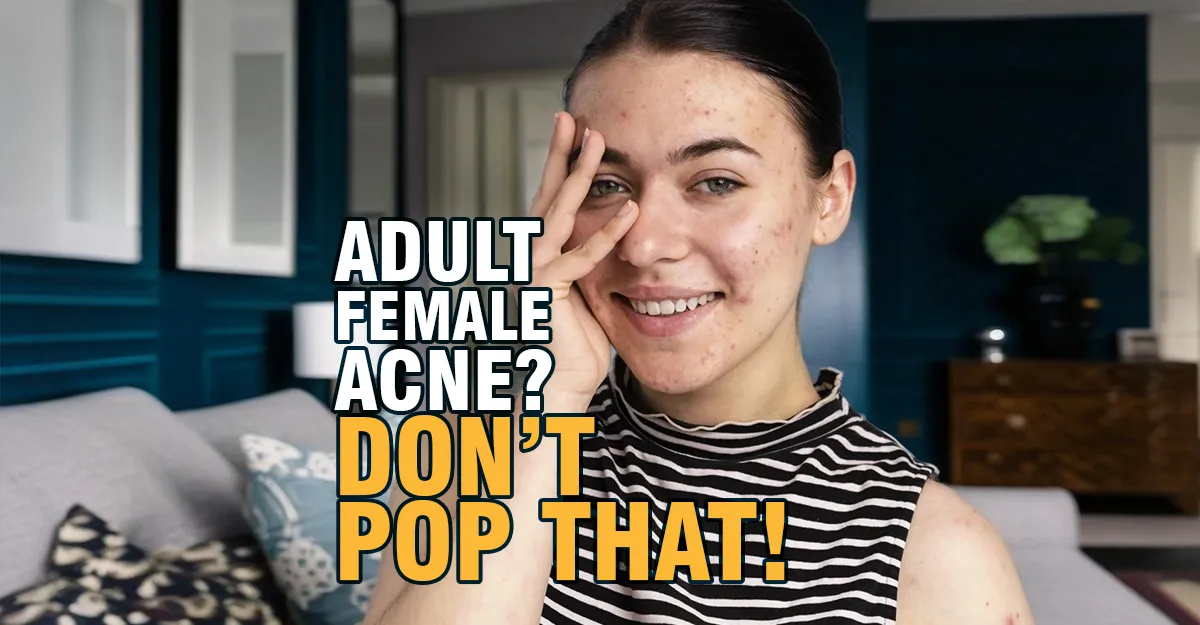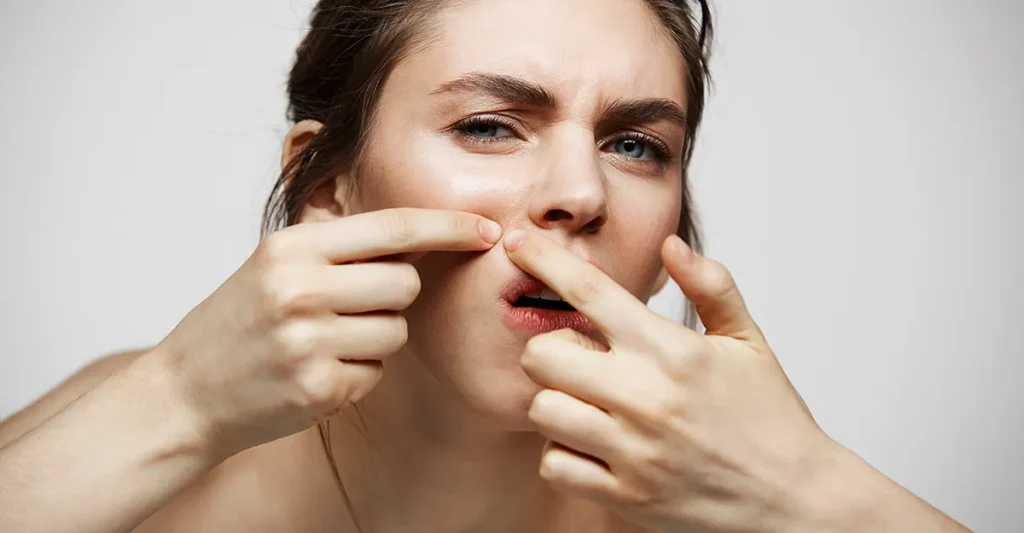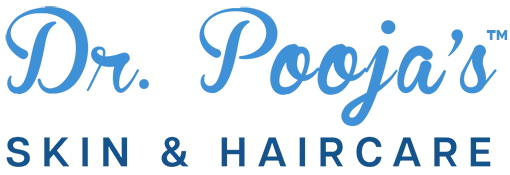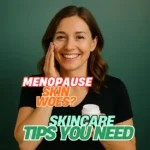Your cart is currently empty!

Adult female acne (AFA) is a persistent skin condition that affects millions of women worldwide, often impacting their confidence and professional lives. This comprehensive guide explores the causes, treatments, and natural solutions for AFA, providing valuable insights to help you achieve clearer, healthier skin.
Understanding Adult Female Acne
Adult female acne is a complex skin condition that affects women over the age of 25. It can be a continuation of adolescent acne or manifest for the first time in adulthood. Unlike teenage acne, AFA tends to be more persistent and challenging to treat, making it crucial to understand its underlying causes and effective management strategies.
Impact of Adult Female Acne
AFA can have a significant impact on a woman’s life, affecting both personal and professional spheres. Many women report feeling self-conscious and less confident in social and work situations due to their skin concerns. The visible nature of acne can lead to decreased self-esteem and even social anxiety, making it essential to address both the physical and emotional aspects of this condition.
Common Causes of Adult Female Acne
Several factors contribute to the development of AFA:-+
- Hormonal Imbalances: Fluctuations in hormone levels, often associated with conditions like Polycystic Ovary Syndrome (PCOS) or hyperandrogenism, can trigger acne breakouts.
- Genetics: A family history of acne can increase your likelihood of developing the condition.
- Lifestyle Factors: Diet, sleep patterns, and skincare routines can all influence the health of your skin.
- Stress: High levels of stress can exacerbate acne by increasing inflammation and oil production.
- Cosmetic Products: Some makeup and skincare products can clog pores and contribute to acne formation.
- Medications: Certain medications may have side effects that include acne as a symptom.
- Environmental Factors: Pollution, humidity, and exposure to irritants can aggravate acne-prone skin.
Understanding these causes is crucial for developing an effective treatment plan. For those interested in exploring natural remedies, our Ultimate guide to Kudzu offers insights into traditional plant-based solutions that may complement your acne treatment regimen.
Hormonal Imbalances and Adult Female Acne
Hormonal fluctuations play a significant role in AFA. Conditions like PCOS can lead to an overproduction of androgens, which stimulate sebum production and contribute to acne formation. It’s essential to work with a healthcare professional to address any underlying hormonal imbalances as part of your acne treatment plan.
Role of Diet in Managing Adult Female Acne
While the link between diet and acne is still being studied, some evidence suggests that certain foods may influence skin health. A balanced diet rich in antioxidants, omega-3 fatty acids, and low-glycemic foods may help support clear skin. Consider incorporating the following into your diet:
- Fruits and vegetables high in antioxidants
- Omega-3 rich foods like fatty fish and flaxseeds
- Whole grains and legumes
- Probiotic-rich foods for gut health
Stress Management for Clearer Skin
Chronic stress can exacerbate adult female acne by increasing inflammation and oil production. Implementing stress-reduction techniques can be beneficial for both your skin and overall well-being:
- Practice mindfulness meditation
- Engage in regular physical exercise
- Prioritize adequate sleep
- Consider stress-reducing activities like yoga or tai chi
Developing an Effective Skincare Routine

A consistent, gentle skincare routine is crucial for managing adult female acne. Here are some key steps to include:
- Cleanse: Use a mild, non-comedogenic cleanser twice daily to remove excess oil and impurities.
- Exfoliate: Incorporate gentle exfoliation 1-2 times a week to remove dead skin cells and unclog pores.
- Treat: Apply targeted treatments containing ingredients like salicylic acid or benzoyl peroxide to active breakouts.
- Moisturize: Use a lightweight, oil-free moisturizer to maintain skin hydration without clogging pores.
- Protect: Apply a broad-spectrum sunscreen daily to prevent hyperpigmentation and protect your skin from UV damage.
Our Trqois Terra Kudzu-based Face Cream with SPF-15 offers both moisturizing and sun protection benefits, making it an excellent addition to your daily skincare routine.
Natural Remedies for Adult Female Acne
Many women seek natural alternatives to conventional acne treatments. While it’s essential to consult with a dermatologist for severe cases, some natural remedies may help manage mild to moderate acne:
- Green Tea: Green tea, particularly when chilled and applied as a compress, is rich in antioxidants like EGCG. Studies suggest these antioxidants may help reduce sebum production and inflammation, two key factors in acne breakouts.
- Aloe Vera: Pure aloe vera gel, extracted directly from the plant, has soothing and hydrating properties. Research suggests it may help calm irritated skin and promote healing of acne lesions.
- Honey: With its antibacterial and anti-inflammatory properties, honey can be used as a gentle spot treatment. You can add a few drops of fresh lemon juice for additional anti-pigment effect.
- Chickpea, turmeric and cold milk face pack: Create a paste by combining chickpea powder (also known as besan), a pinch of turmeric, and cold milk. This blend may help reduce inflammation and excess oil production, both of which can contribute to acne breakouts.
- Mashed banana and cold milk face mask: The combination of mashed banana and cold milk can create a soothing and hydrating mask. The natural enzymes in bananas may help gently exfoliate the skin while the milk provides moisture.
Remember to patch test any new natural remedy before applying it to your face, as some ingredients may cause irritation in sensitive individuals.
Importance of a Holistic Approach
Managing adult female acne requires a comprehensive approach that addresses both internal and external factors. In addition to skincare and natural remedies, consider the following:
- Regular exercise to promote circulation and reduce stress
- Adequate hydration to support skin health
- Avoiding touching your face throughout the day
- Regularly cleaning items that come into contact with your face, such as phone screens and pillowcases
For those experiencing acne around the eye area, Trqois Terra Intense Nourishing Under Eye Cream can help address both acne concerns and signs of aging in this delicate region.
Seasonal Considerations for Acne-Prone Skin
As the seasons change, so do the needs of your skin. During the festive season, for example, increased stress, dietary changes, and exposure to different environments can impact your skin. Our guide on festive season skin care offers valuable tips for maintaining clear skin during challenging times.
When to Seek Professional Help
While many cases of adult female acne can be managed with over-the-counter treatments and lifestyle changes, it’s important to recognize when professional help is needed. Consider consulting a dermatologist if:
- Your acne is severe or cystic
- Over-the-counter treatments aren’t effective after several weeks of use
- You’re experiencing significant scarring or hyperpigmentation
- Your acne is causing emotional distress or affecting your quality of life
A dermatologist can provide personalized treatment options, including prescription medications or advanced therapies like chemical peels or light treatments.
Frequently Asked Questions
Is adult female acne different from teenage acne?
Adult female acne tends to be more inflammatory, with fewer comedones compared to teenage acne. It often appears on the lower face, jawline, and neck, whereas teenage acne is typically more prominent on the T-zone.
Can birth control pills help with AFA?
Some birth control pills can be effective in managing hormonal acne by regulating androgen levels. However, this treatment option should be discussed with a healthcare provider to determine if it’s appropriate for your individual case.
Are there any foods I should avoid to prevent acne breakouts?
While the relationship between diet and acne is complex, some studies suggest that high-glycemic foods and dairy products may exacerbate acne in some individuals. Keeping a food diary can help you identify potential trigger foods.
How long does it typically take to see results from acne treatments?
Most acne treatments require 6-8 weeks of consistent use before significant improvements are visible. It’s important to be patient and consistent with your chosen treatment plan.
Can stress really cause acne?
Stress doesn’t directly cause acne, but it can worsen existing acne by increasing inflammation and oil production in the skin. Managing stress through relaxation techniques and self-care can be beneficial for overall skin health.
Is it safe to use natural remedies alongside prescription acne treatments?
While many natural remedies can be beneficial, it’s important to consult with your dermatologist before combining them with prescription treatments. Some natural ingredients may interact with medications or cause skin irritation.
Conclusion: Embracing Clear, Confident Skin
Adult female acne can be a challenging and persistent condition, but with the right approach, it is manageable. By understanding the causes, implementing an effective skincare routine, and addressing lifestyle factors, you can work towards clearer, healthier skin. Remember that everyone’s skin is unique, and what works for one person may not work for another. Be patient with your skin, and don’t hesitate to seek professional advice when needed.
At our natural beauty products brand, we’re committed to supporting you on your journey to clearer skin with our range of gentle, effective products designed specifically for adult acne-prone skin. From our Trqois Terra Kudzu-based Face Cream with SPF-15 to our Intense Nourishing Under Eye Cream, we offer solutions that address both your acne concerns and overall skin health.
Embrace your skin’s journey, and remember that clear, confident skin is achievable with the right care and patience. Your skin is unique, beautiful, and deserving of the best care possible.
Looking for effective treatment for Melasma? Read this in-depth article to find more.
References
- Bagatin E, Freitas THP, Rivitti-Machado MC, Machado MCR, Ribeiro BM, Nunes S, Rocha MADD. Adult female acne: a guide to clinical practice. An Bras Dermatol. 2019 Jan-Feb;94(1):62-75. doi: 10.1590/abd1806-4841.20198203. Erratum in: An Bras Dermatol. 2019 Mar-Apr;94(2):255. doi: 10.1590/abd1806-4841.2019940202. Machado MCR [corrected to Rivitti-Machado MC]. PMID: 30726466; PMCID: PMC6360964.
- A Look at the Rise in Adult Acne in Women (dermatologytimes.com)
- Zari S, Alrahmani D. The association between stress and acne among female medical students in Jeddah, Saudi Arabia. Clin Cosmet Investig Dermatol. 2017 Dec 5;10:503-506. doi: 10.2147/CCID.S148499. PMID: 29255370; PMCID: PMC5722010.
More from the blog
- 5 Powerful Menopause Skincare Secrets Revealed
- 5 Powerful Ways to Stop Teen Hair Fall
- 5 Vital Shopping Tips for Skincare Products
- 5 Effective Solutions for Neck Pigmentation
- 5 Effective Ways to Stop Excessive Sweating (Hyperhidrosis)
Recommended Topics
Popular Tags
40s aging hair care biotin choosing right cobalamin collagen dry itchy skin excessive sweating excess vitamin hair care hair care in 40s hair fall hair health hair loss treatment hydroquinone hyperhidrosis menopause menopause skincare menopause skin care minoxidil neck darkening neck pigmentation perimenopause scalp allergy scalp allergy treatment scalp health shampoo shampooing side effects skin care skincare skincare products skin health sunscreen supplement safety sweating problem teen hairfall teen hair thinning too much sweat tretinoin vitamin b12 vitamin d vitamin overdose washing hair wrinkles












Leave a Reply